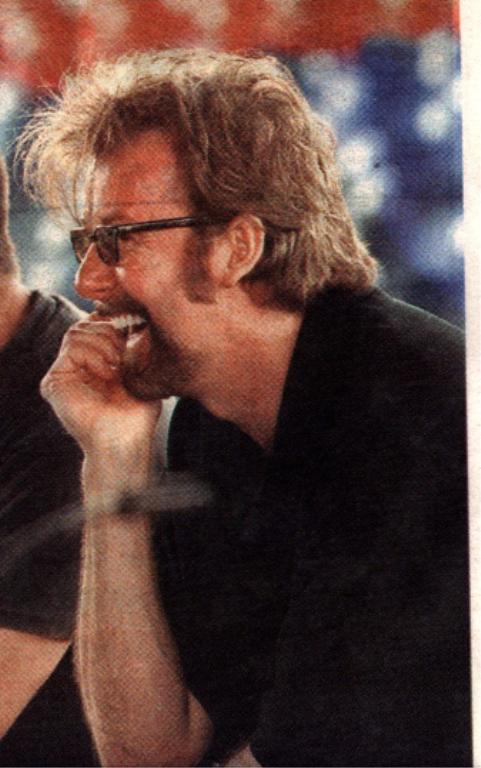
RONNIE DUNN STORY
For Ronnie Gene Dunn,Born June 1 1953
Music was built into his DNA. Born of a truck
driving
honky tonk singing father with a checkered past
and a devout church-going mother determined to save
him,
He was steeped in both of life's extremes from the
beginning.
Playing sax in the Arkansas school system's music
program,
he spent hours learning the melodies from
Ace Cannon records, remembering, "My father never told
me loved me,
but he brought me those records"
For Dunn, cripplingly shy and looking for his place in
the world, it was all
about being the one of 20 grandchildren to give
himself over to preaching.
He went first to one Bible college, then Abilene
Christian
("they had the better music program"), where weekends
found him loading up his
little Mercury Capri ("so small, once you loaded the
bass amp in, you couldn't put
the seat right")and heading out to small rural
churches to lead their music ministry.
"I was quiet and not so good in interviews. I didn't
give long answers,
which had nothing to do with what was in my heart,
but what I was able to say,
" recalls the man with a throat like a stiletto.
"But to my family -- both sides, the long line of
deacons on my mother’s side and the
poor destitute sinners who just wanted to wash away
the shame of my father
[being an ex-con, who did 9 years in Leavenworth]
--once I got 'the call,
"I was the one, the hero."
Dunn also got the call to play in the beer
joints. The pull of the night
being as strong as the pull of the light.
It wasn't too long before the Dean suggested that Dunn
couldn't do both --
and it wasn’t much longer after that the young man who
could barely make eye contact
landed in Tulsa, where he found himself waist deep in
the gonzo rock'n'roll fringe
that was lost dogs, Englishmen, Bonnies Raitt and
Bramlett, Emily Smith,
the Isley Brothers, Leon Russell, JJ Cale, the Gap
Band, occasionally Eric Clapton and
Joe Cocker, Shelter Records, the original country
superbusiness aggregation
the Halsey Company and assorted and sundry lost
children of the night and the reverb.
"It was where I could mainline the most life,"
acknowledges Dunn now,
"Seeing it all go down to the extreme from the
bandstand.
From where I came from, it was like being set on fire
--
and they all lived for the music.
It was an amazing thing. Electric. And I couldn't get
enough."
Dunn, was finding the catharsis of religion on the
bandstand. "The ultimate
religious message is that you are simply free to be
human without restriction,
but are completely loved and accepted in the end.
There's no intellectual way to accept
it… it just is.
But you're not gonna understand there's something out
there beyond your power of reason
like music, the way that it feels.
"For me, it was 24/7 consumption -- to the point where
it stood to be almost a damaging
addiction. Here I was this quiet church kid, hanging
out with these wild ass
rock & roll people,
hitting the Caravan where (Bob's brother) Johnny
Wills was playing. And back then,
Tulsa was a wild swing town --so I'd get called
up.
"When 'Urban Cowboy' hit, I'd gone to see Gatemouth
Brown at Cain's Ballroom.
His steel player knew some people with money who were
going to open a giant honky tonk.
We signed on as the house band… and never looked
back."
Well, Dunn did write "Boot Scootin Boogie"
(originally recorded by 10x Grammy winners
Asleep at the Wheel)and "Hard Working Man" during
that tenure, and went on to win the
Marlboro Talent Search.
He also had a couple fizzled out indie record deals,
and an almost with Shelter Records'
Denny Cordell, who was finishing the first Tom Petty
album and confessed,
"I don't know that much about country music,"
but offering encouragement, insight into the Willis
Alan Ramsey record they'd just released
and a chance meeting with Van Morrison.
While Brooks was carving out a name as a writer and
also pursuing solo deals
that were going nowhere,each had caught the attention
of Arista Nashville founder
Tim DuBois. The songwriter/producer had a feeling the
pair would have chemistry --
and introduced them. For all their differences, there
was enough common ground in
the lost nights,human witness, love of good stories
and basic language, that their
was a writing affinity. And the tension between
Brooks' freewheeling performance style
and Dunn's intense vocal performance created a
tautness that would fire jukeboxes
for the next 13 years, 4 Entertainer of the Year
Awards and more.

Copyright © 2004, Slim's Place, All Rights Reserved.
